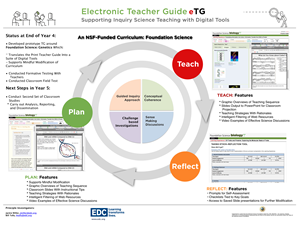This project is developing and testing a prototype electronic teacher's guide for a 12-week genetics unit in the NSF-funded curriculum titled Foundation Science: Biology to determine how it impacts high school teachers' learning and practice. The electronic guide, which is based on an existing print guide, has a flexible design so that it anticipates and meets the curriculum planning and support needs of teachers with different knowledge/skills profiles.
Electronic Teacher Guide: Its Development and Use in Supporting Educative Curricula

The hallmark of many inquiry-based curricula is a hefty teacher guide that accompanies the student materials. These teacher guides are generally designed to be ‘educative’, intended both to help teachers implement the materials with fidelity to the developers’ intentions and to give teachers opportunities to incorporate new instructional practices into their teaching such as guided inquiry, sense-making discussions, and formative assessment. In many cases, the teacher guide may be the only professional development experience teachers have when embarking on the implementation of a new curriculum.
Yet despite the best intentions of curriculum developers in providing accessible and useful teacher support materials, use of teacher guides is often random and occasional. The guides tend to be large, dense, and separate from the student books, making them unwieldy, difficult to navigate, and time consuming to use. Teachers may not realize the importance of these guides in the implementation of the materials, assuming that the contents are ancillary and supplemental. However evidence from field tests of these curricula indicate that when teachers do use them, they find them excellent resources that support the teaching of the curriculum and the acquisition of new instructional strategies.
To determine whether digital technology can make large print teacher guide more accessible and useful, EDC is developing an electronic Teacher Guide (eTG) based on the print guide for Foundation Science: Genetics. Our goal is to develop a cybertool that helps teachers plan and teach their curriculum, reflect on its execution, and enhance their teaching practice. The eTG is a cloud-based web application that lets teachers access the Foundation Science curriculum and their planning and teaching notes anytime, anywhere. In the tool they find teaching tips, strategies and videos that are aligned with the student materials, features that encourage them to mindfully modify the curriculum with fidelity to intentions of curriculum, and slides that once modified, can be saved and projected for students to guide their inquiries.
The centerpiece of the eTG is the Foundation Science: Genetics curriculum, in the form of an eBook that includes the text of both the student book and teacher guide. Included are a variety of digital supports, features that help teachers Plan, Teach, and Reflect on their curriculum and teaching. In Plan mode teachers can a) see graphic overviews of the teaching sequence, b) modify a basic “deck” of slides for their students while keeping the developers’ intent in mind, c) draw on a set of filtered web resources in adding to the materials, and d) can access videos and other graphical and text supports to help students have rich and grounded discussions about the meaning of the classroom activities and readings. In Teach mode, teachers project their modified ‘slide deck’ and use it to guide student interaction and discussion. As they proceed, teachers can modify their decks as needed. The Reflect mode provides checklists which enable the teacher to self-assess her/his attainment of the key goals of the learning experience and to make decisions about modifications of the material for the future.
In the midst of the fourth year of the eTG project, we have completed the prototype, tested it with teacher users for appeal, comprehensibility and effectiveness, and carried out field tests in several classrooms to investigate how and to what end teachers use the different features, and with what outcomes. The final year of the project will see a second round of classroom field-testing, data analysis and dissemination of our findings in the form of comparative case studies.
Project Videos
2016 STEM for All Video Showcase

|
Title: What is Effective Science Curriculum?
Presenter(s): Jacqueline Miller, Nevin Katz, & Katherine Paget |
2015 STEM for All Video Showcase
 |
Title: Content Coherency
Presenter(s): Jacqueline Miller, Nevin Katz, & Katherine Paget |
Project Materials
| Title | Type | Post date Sort ascending |
|---|---|---|
| No content available. | ||